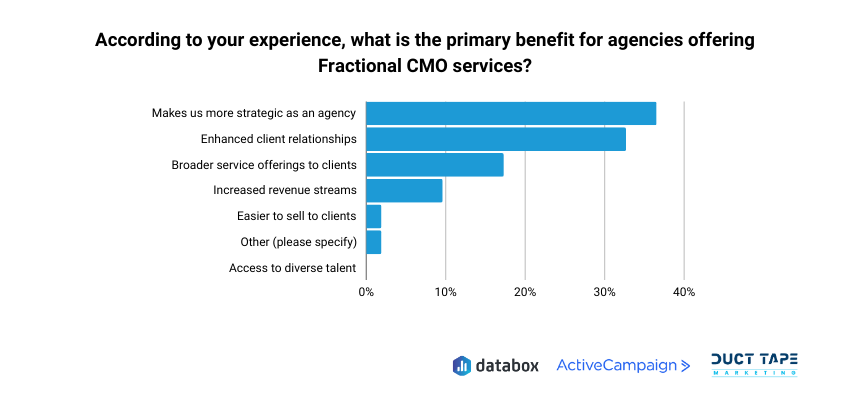Ep 152: Conversation with John Jantsch: How your agency can increase retention & profitability by offering a fractional CMO as a service
In this episode with John Jantsch we discuss the he need to move SMBs from tactics to strategy & how agencies can increase profits by developing a fractional CMO capacity to do that.

Part 1 starts 00:13 - The need to move SMBs from Tactics to Strategy & how fractional CMO’s can do that
John Jantsch is a seasoned consultant, speaker, and bestselling author, notably recognized for his Duct Tape Marketing brand. He shares his journey of owning an agency for 30 years, highlighting his affinity for small to midsize businesses and the challenges they face, especially regarding budget and focus. Jantsch's Duct Tape Marketing was his solution to the market's need for effective and straightforward marketing services. Over time, his approach evolved into licensing his methodology to other agencies and consultants.
In the last five years, Jantsch has pivoted towards offering fractional Chief Marketing Officer (CMO) services, capitalizing on the growing acceptance and need for part-time executive roles. He explains that the fractional CMO concept is cost-effective, providing senior marketing leadership at a fraction of the cost of a full-time CMO, particularly beneficial for companies with revenues under $30 million.
Jantsch observes an increasing demand for strategic marketing services, partly due to the market's rapid changes and the desire for differentiation among agencies. He notes that while there is a prevalent focus on lead generation and short-term goals in the industry, there's a growing recognition of the value of strategic planning, especially for businesses crossing the million-dollar revenue threshold.
Resource: Fractional CMO Insights Survey: Why Businesses Hire Them
Part 2 starts 11:21 - Helping agencies to increase profits by developing their own fractional CMO capacity
In the second part of the interview, John Jantsch delves into the challenges and nuances of adopting a fractional Chief Marketing Officer (CMO) role within agencies. He acknowledges the difficulty agencies face when shifting from execution-focused services to strategic consulting, especially with existing clients who may not perceive them in this new light. Jantsch suggests that offering strategic services as an add-on and targeting a more ideal client base can facilitate this transition.
He critiques the common misunderstanding of having a marketing "plan" when businesses merely execute isolated tactics without a cohesive strategy. Jantsch emphasizes the importance of a targeted approach, focusing on the top 20% of customers and aligning marketing efforts with the entire customer journey, which he represents through the "marketing hourglass" concept. This approach entails understanding the customer's needs, refining messaging, and integrating strategic content creation.
Jantsch also discusses the foundational phase of client engagement, where he insists on starting with a strategy phase, lasting about 45 days, to build trust and set the groundwork for further marketing efforts. This phase allows for the identification of a client's true challenges and needs, fostering a relationship where the agency transitions from a vendor to a trusted advisor.
He highlights the importance of the CMO as the advocate for the customer within the company, ensuring that the entire customer experience, from initial contact through sales and service, aligns with the strategic marketing plan. Jantsch's approach underscores the need for a comprehensive understanding of the client's business processes, which is crucial for delivering effective marketing solutions and establishing a long-term partnership.

Part 3 starts 21:45 - How to begin implementing a fractional CMO relationship with your client
In the final part of the interview, John Jantsch discusses building trust and managing dynamics within client organizations as a fractional CMO. He notes the common presence of internal politics and resistance, but emphasizes that many organizations lack strategic direction, making them receptive to outside expertise. Jantsch highlights the importance of establishing authority through a strategic process, which often leads to a more influential role within the client's operations, sometimes even involving personnel changes.
Jantsch shares that the average client retention for agencies adopting the fractional CMO model is 19 months, significantly higher than the industry average. He stresses the ongoing nature of marketing, with relationships evolving from intensive involvement to advisory roles as clients mature their internal capabilities. The discussion also covers the importance of regular strategy reviews, ideally every 90 days, to ensure alignment with goals and adapt to changes.
Regarding success metrics, Jantsch mentions tracking about 14 key metrics, including customer acquisition cost and lifetime value, acknowledging the challenges in obtaining reliable data. He emphasizes the importance of starting the data-tracking conversation early to identify and address gaps in client operations.
Finally, Jantsch discusses the role of artificial intelligence (AI) in marketing, viewing it as a tool that amplifies the need for strategic context and human insight. While AI can enhance efficiency and content production, Jantsch asserts that its effectiveness depends on the underlying strategy and original content, reinforcing the value of human expertise in marketing.
Resource Article: How to Become a Fractional CMO
AI disclosure: the section summaries were created by ChatGPT based on the transcripts of our conversations and edited/checked by a fractional human for accuracy.
